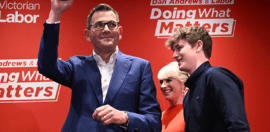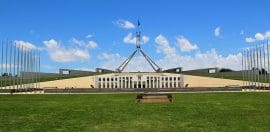Young people are angry, so why aren’t they getting political?

10 August 2022 at 8:20 pm
We need a “youthquake”, young people taking decision-making power into their own hands, writes Meg Watkins.
The general consensus seems to be that young people are increasingly disillusioned and disengaged with politics – at least how we’re perceived by older generations and the media. But the reality is that young people are actually more engaged than ever – just in a different way.
The politics of the past has been very much about electoral engagement, i.e. voting and joining a political party. Now more than ever, us young people are moulding our own type of politics: the politics of petition-signing, product boycotting, campaign participation and protesting. We saw this with the global School Strike for Climate movement led by Greta Thunberg, which successfully mobilised millions of youth around the world.
Young people are acutely aware of the state of the world. And we are acutely aware of the responsibility placed upon our shoulders by previous generations who have failed to address major issues, such as the climate emergency.
This inaction has placed a heavy burden upon us: with more than three in four young Australians frightened for the future due to climate concerns, I believe climate anxiety is the shadow pandemic of our generation. Fortunately, many of us have found a way to fuel this fear and anger into a hunger for change – a spark of hope to create a better future for ourselves and generations to come.
It’s what led me to stand as a candidate in the upcoming Victorian state election with the Animal Justice Party. At 24 years old, I am one of the youngest candidates in the field. And while some say this makes me inexperienced or naive, I believe my age is my biggest strength.
We know that people cannot be what they cannot see. My decision to run for office came from this understanding – knowing that people with lived experiences must be placed at the forefront of decision-making that affects them.
This not only applies to youth, but to all vulnerable and marginalised populations. Fortunately, I believe we’re witnessing a gradual societal shift towards allowing these groups to lead the conversation around issues that directly affect them.
The 2022 Federal Election was a hopeful demonstration of this, where voters came out in droves to call for just representation in Parliament. There are now a record number of women in the House of Representatives – 58 to be exact – along with individuals appointed to positions where they can actually speak for their communities, including Wiradjuri woman Linda Burney MP as the Minister for Indigenous Australians.
As a young woman, disabled person, renter and activist with queer loved ones, I am passionate about representing all of these demographics from a place of real-life experience and am heartened to see these societal changes reflected in politics.
But this move is happening far too slowly. The disabled community was faced with this abrupt reality in July, when the bid to allow Jordon Steele-John, a disabled member of Parliament and NDIS participant, to be appointed as the chair of the NDIS Joint Standing Committee was voted down in the Senate. We know that elevating vulnerable groups into positions of leadership and power is the single biggest way to ensure their collective voices are heard and amplified – our politicians just have to be brave enough to take up opportunities to transform the current system of representation.
This is why I want to see Parliament shaken up with a “youthquake” – young people taking decision-making power into their own hands. We must empower young people to take bold actions, like running for election, and give them a platform to amplify their own voices at a political and legislative level.
Because after all, the halls of Parliament are where real change is made – systemic, long-lasting change which affects all aspects of the social sector as well as environmental reform. We need young people actually sitting at the table where change is made, so that we can advocate for ourselves.
So how do we take our youth’s political rage and passion and redirect it into supporting young people to take up positions of leadership?
For starters, let’s stop mistaking youth disillusionment with indifference.
We are not indifferent, and we are not silent, we are just sick of middle-aged white men making decisions about our future.
And if there’s one thing I’m sure of, it’s that no one should speak on behalf of young people, except young people ourselves.







